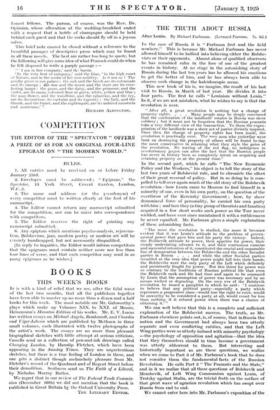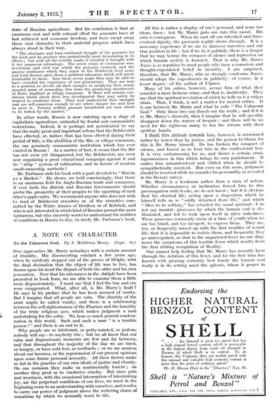THE TRUTH ABOUT RUSSIA
After Lenin. By Michael Farbman. (Leonard Parsons. is. exl.)
IN the case of Russia it is "Farbman first and the field nowhere." This is because Mr. Michael Farbman has never allowed himself to be bullied into believing either the Bolshe- vists or their opponents. Almost alone of qualified observers he has remained calm in the face of one of the greatest events in history. At no stage in the astonishing story of Russia during the last ten years has he allowed his emotions to get the better of him, and he has always been able to observe each change in the kaleidoscopic scene.
This new book of his is, we imagine, the result of his last visit to Russia, in March of last year. He divides it into four parts. The first he callg " Leninism without Lenin."
In it, if we are not mistaken, what he wishes to say is that the revolution is over.
" After all, a great revolution is nothing but a change of property rights. . . . Many people may be deeply convinced that the confiscation of the landlords' estates in Russia was sheer robbery ; but it must not be forgotten that the Russian peasants take a very different view of the transaction: To them the expro- priation of the landlords was a sheer act of justice divinely inspired. Once then the change of property rights has been made, the revolution is practically over. The very men who yesterday were bent on destroying the property of others will be found to-day the most conservative in retaining what they style the gains of the revolution. No waving of the red flag, no indulgence in revolutionary jargon can alter the fact that the Russian people has never in history been so completely intent on acquiring and retaining property as at the present time."
In the second part, which he calls " The New Economic Policy and the Workers," his object is to tell the story of the last two years of Bolshevist rule, and to chronicle the effect of their great reversal of policy. But in so doing he is com- pelled to tell over again much of the old story of the Bolshevik revolution—how Lenin came to Moscow to find himself in a minority of one, even in his own party, on the question of the overthrow of the Kerensky Government ; how, by sheer demoniacal force of personality, he carried his own party with him ; and how they (a tiny group of theorists and fanatics) acquired in a few short weeks such power as the Tsar never wielded, and have ever since maintained it with a ruthlessness he never equalled. Mr. Farbman gives a simple explanation of these astonishing facts.
" The more the revolution is studied, the more it becomes evident that it was Lenin's attitude to the problem of govern- mental power that gave him and his .party the victory. Indeed, the Bolshevik attitude to power, their appetite for power, their steady undeviating advance to it, and their continuous exercise and successful retention of it, constituted the crucial and unpassable line of demarcation between the Bolsheviks and the other Socialist parties in Russia . . . and while the other Socialist parties trembled at the very idea that power might fall into their hands, the Bolsheviks were the only party of the Left which definitely and persistently fought for power. But this thirst for power was so contrary to the traditions of Russian political life that even the Bolshevik rank and file had time and again to be reassured by Lenin that the assumption of power was necessary and by no means wicked or degrading. On the very eve of the Bolshevik revolution he issued a pamphlet in which he said : I continue to believe that any political party—especially a party which represents a progressive class—would lose the right to exist, would be unworthy to be considered a party at all, would count for less than nothing, if it refused power when there was a chance of obtaining it. "
We can well believe that this is a complete and sufficient explanation of the Bolshevist success. The truth, as Mr.
Farbman elsewhere points out, is, of course, that in Russia the nation and the Government had always been two utterly separate and even conflicting entities, and that the Left Wing parties were so utterly imbued with minority psychology the psychology of opposition and agitation—that the idea that they themselves should in time become a government was utterly abhorrent to them. But interesting and historically important as are these questions, we realize when we come to Part 3 of Mr. Farbman's book that he does not consider them the fundamental facts of the Russian Revolution. He calls Part 3 " The Peasants and the State," and in it we realize that all these questions of Bolshevik and Menshevik, of Left Wing Communism against Lenin, of Trotsky against Stalin, are the trivial froth on the surface of that great wave of agrarian revolution which has swept over Russia from end to end.
We cannot enter here into Mr. Farbman's exposition of the state of Russian agriculture. But his conclusion is that at enormous cost and with colossal effort the peasants have at last achieved real economic freedom, and have swept away those vast obstacles to their material progress which have always stood in their way.
" The obstinate and long-continued struggle of the peasants for the land and its produce was undoubtedly most devastating in its effects ; but with all the terrible waste it entailed it brought with it one enormous advantage. The seven years of continuous war, revolution and civil war which the peasants endured, and the passive resistance which they made to the Bolshevik food army and food decrees gave them a political education which will prove invaluable to them. Into these seven years they may be said to have crowded the experience of two generations. They are now in a position to devote all their energies to satisfying their newly aroused sense of ownership, free from the paralyzing interference of State, landlord or village commune. If there still remain con- ditions which check their free development they may safely be trusted to eradicate them. They now understand their strength and are self-conscious enough to see where danger lies and how to meet it. Twenty million peasant households are now about to be tested by the market."
In other words, Russia is now entering upon a stage of capitalistic agriculture, unlimited by feudal and communistic restrictions. Indeed, it is perhaps not paradoxical to say that the really great and important reform that the Bolshevists have effected, or, rather, that has been effected during their period of rule, is the abolition of the Mir, or village commune, the one genuinely communistic institution which has ever existed in Russia ! As a matter of fact, it seems that the Mir has not even yet disappeared, but the Bolshevists are even now organizing a great educational campaign against it and its " strip " system of cultivation, and in favour of modern small-ownership methods 1
Mr. Farbman ends his book with a part devoted to " Russia as a Market." He shows, we hold convincingly, that there is an enormous field for Anglo-Russian trade and commerce, if ever both the British and Russian Governments should prefer the prosperity of their peoples to the upsetting of each other's apple-carts. We recommend anyone who does not wish
to read of Bolshevist atrocities or of the atrocities com- mitted by the White Armies of Deniken or of Kolchak, and who is not interested in which kind of Russian proved the more barbarous, but who sincerely wants to understand the realities A' conditions in Russia to-day, to study Mr. Farbman's book,











































 Previous page
Previous page